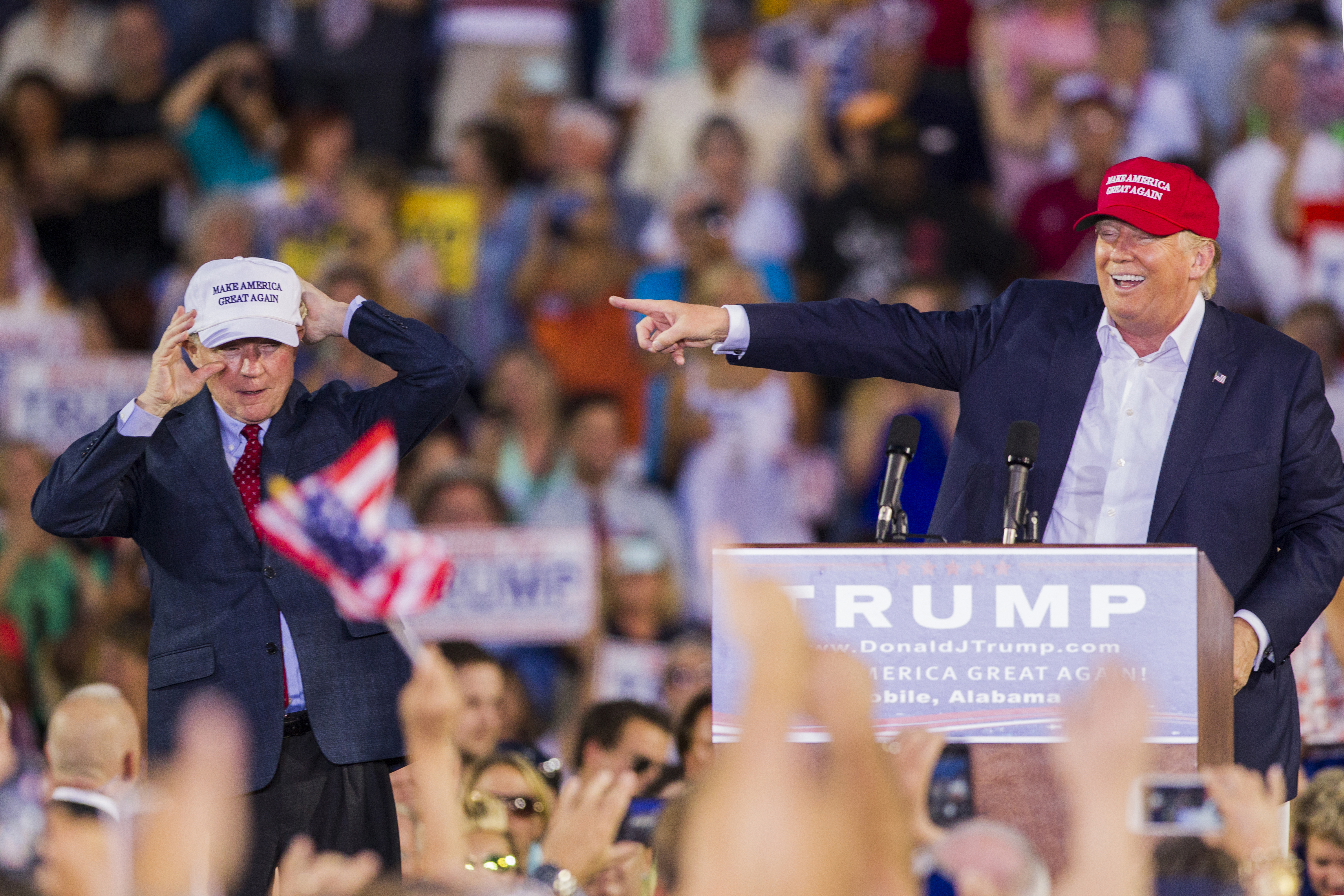Jeff Sessions' reefer madness
Donald Trump's pick for attorney general is not a fan of pot. Not at all.


A free daily email with the biggest news stories of the day – and the best features from TheWeek.com
You are now subscribed
Your newsletter sign-up was successful
These are high times for pot in America.
Last month, California, Massachusetts, Maine, and Nevada voted to legalize the recreational use of marijuana, bringing the total number of states where recreational pot use is legal to eight. And medical marijuana use is either legal or about to be implemented in 28 states and the District of Columbia. The legal marijuana industry is expected to do about $7 billion in sales in 2016, and to grow almost exponentially as more states pursue recreational and medical legalization. Meanwhile, popular support for legalized pot is higher than it's ever been in Gallup's 47-year history of asking Americans about weed, with three in five supporting legalization.
But what about Donald Trump? And more specifically, what about his choice for attorney general, Sen. Jeff Sessions (R-Ala.)?
The Week
Escape your echo chamber. Get the facts behind the news, plus analysis from multiple perspectives.

Sign up for The Week's Free Newsletters
From our morning news briefing to a weekly Good News Newsletter, get the best of The Week delivered directly to your inbox.
From our morning news briefing to a weekly Good News Newsletter, get the best of The Week delivered directly to your inbox.
Sessions has called for more federal prosecutions of marijuana growers and businesses in states where it is legal. He said in April that it's important for the government to send a "message with clarity that good people don't smoke marijuana." He declared that "we need grownups in charge in Washington to say marijuana is not the kind of thing that ought to be legalized, it ought not to be minimized, that it's in fact a very real danger."
One of the major difficulties in the burgeoning pot industry has long been the federal government's ability to prosecute businesses that the states say are legal. Making Sessions the head of the agency in charge of federal law enforcement and prosecutions has many in the cannabis community quite concerned.
"I can tell you that Sen. Sessions' nomination has a lot of people honestly scared for their businesses," said Jason Thomas, a former detention officer and marshal's deputy in Colorado who volunteers for the group Law Enforcement Against Prohibition. "He could dramatically change the legalized industry, recreation or medical. He could task the Department of Justice, the DEA, and even the FBI to work on shutting down the industry."
Robert Capecchi, the director of federal policies at the Marijuana Policy Project, noted that Sessions would face at least one stumbling block: The Rohrabacher-Farr amendment to the annual appropriations bill (which has to be renewed annually) prohibits the Department of Justice and the DEA from using money to target or prosecute state-compliant medical marijuana businesses. But other than that hurdle, Capechhi said, the only thing standing between Sessions and a crusade against states' legal pot industries is "just DOJ policy." And policies are not laws. "There's nothing set in stone."
A free daily email with the biggest news stories of the day – and the best features from TheWeek.com
Capecchi, though, is holding out hope, noting that Trump had suggested on the campaign trail that he supported medical marijuana and the states' rights argument in favor of full legalization. "I think the business man in Mr. Trump can see if you go after these businesses you drive all this legal and regulated marijuana market back underground."
Michael Liszewski, the director of government affairs for Americans for Safe Access, however, isn't banking on Trump's campaign promises quite yet. "A lot of people are aware of the pretty good things that President-elect Trump has said about medical marijuana," he said, "but Trump has sometimes changed his mind on certain positions."
Liszewski noted that Sessions isn't even the only Cabinet nominee to be opposed to marijuana. "Tom Price being nominated to Health and Human Services? That's another medical marijuana opponent being nominated to the Cabinet," he said.
In addition to the Rohrabacher-Farr amendment and an August appeals court ruling directing the DOJ to abide by it, Obama's attorneys general have issued a number of guidances on enforcing federal marijuana laws in states where it is legal for recreational or medical use, including its 2013 decision not to sue Colorado and Washington for their legalization laws (which was accompanied by a guidance for U.S. attorneys on what kinds of prosecutions they could and should pursue in such states), its 2014 guidance to banks that they might be able to offer financial services to state-compliant cannabis businesses (which the industry deemed insufficient), and a series of memos to U.S. attorneys directing them to focus on the black market for marijuana.
But any of the guidances issued by the department under President Obama, to which Sessions stated his opposition, could simply be rescinded by a Sessions-led Justice Department. And the Rohrabacher-Farr amendment applies only to the medical marijuana industry, leaving the legal recreational industry in four (soon to be eight) states subject to renewed enforcement.
Liszewski fears that most Americans aren't aware that it wouldn't take much to drive the industry into and then under the ground. "They probably have the impression that things are moving towards legality and that it's an inevitable thing," he said. "In the '70s, a lot of people in the marijuana movement also thought [legalization] was inevitable," but the Reagan administration cracked down instead, and it's been a difficult road for many advocates, patients, and business people who want to operate legally.
"All these appointments that are being made by President-elect Trump could really throw all that progress away."
Megan Carpentier is a writer and editor who has worked for The Guardian and Talking Points Memo, among others. Her work has also been published by Rolling Stone, Esquire, The New Republic, The Baffler, Foreign Policy, Ms. magazine, Glamour, and The Washington Post.
-
 How the FCC’s ‘equal time’ rule works
How the FCC’s ‘equal time’ rule worksIn the Spotlight The law is at the heart of the Colbert-CBS conflict
-
 What is the endgame in the DHS shutdown?
What is the endgame in the DHS shutdown?Today’s Big Question Democrats want to rein in ICE’s immigration crackdown
-
 ‘Poor time management isn’t just an inconvenience’
‘Poor time management isn’t just an inconvenience’Instant Opinion Opinion, comment and editorials of the day
-
 The billionaires’ wealth tax: a catastrophe for California?
The billionaires’ wealth tax: a catastrophe for California?Talking Point Peter Thiel and Larry Page preparing to change state residency
-
 Bari Weiss’ ‘60 Minutes’ scandal is about more than one report
Bari Weiss’ ‘60 Minutes’ scandal is about more than one reportIN THE SPOTLIGHT By blocking an approved segment on a controversial prison holding US deportees in El Salvador, the editor-in-chief of CBS News has become the main story
-
 Has Zohran Mamdani shown the Democrats how to win again?
Has Zohran Mamdani shown the Democrats how to win again?Today’s Big Question New York City mayoral election touted as victory for left-wing populists but moderate centrist wins elsewhere present more complex path for Democratic Party
-
 Millions turn out for anti-Trump ‘No Kings’ rallies
Millions turn out for anti-Trump ‘No Kings’ ralliesSpeed Read An estimated 7 million people participated, 2 million more than at the first ‘No Kings’ protest in June
-
 Ghislaine Maxwell: angling for a Trump pardon
Ghislaine Maxwell: angling for a Trump pardonTalking Point Convicted sex trafficker's testimony could shed new light on president's links to Jeffrey Epstein
-
 The last words and final moments of 40 presidents
The last words and final moments of 40 presidentsThe Explainer Some are eloquent quotes worthy of the holders of the highest office in the nation, and others... aren't
-
 The JFK files: the truth at last?
The JFK files: the truth at last?In The Spotlight More than 64,000 previously classified documents relating the 1963 assassination of John F. Kennedy have been released by the Trump administration
-
 'Seriously, not literally': how should the world take Donald Trump?
'Seriously, not literally': how should the world take Donald Trump?Today's big question White House rhetoric and reality look likely to become increasingly blurred
